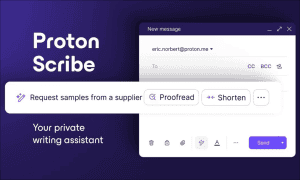How to List Trackers Embedded in Installed Apps on Android

Trackers are embedded software in the apps you install on your phone. Exodus Privacy has a great tool you can use to uncover which apps are spying on you.
Trackers in Android (and iOS) apps are a modern-day reality, the same as they are in websites or apps for other operating systems. But how can you tell which Android apps have them and what exactly they’re tracking? Also, what does an app have permissions to on your phone?
We recently covered that the LastPass app for Android (and iOS) includes marketing trackers. The trackers on Android were discovered by a security researcher using Exodus Privacy tools. So, we thought we would take a closer look at Exodus Privacy and how you can use it on your Android device.
Why Would an App Have Trackers?
A tracker is a piece of software that serves a very simple purpose. Namely, to gather various types of information. This includes who’s using an app and how, or what device they’re using it on.
Why would someone want to do that, you ask? There are multiple reasons. And not all trackers are a bad thing. Some trackers are embedded to make sure the app works as designed (reporting crashes and malfunctions). There are also trackers that will analyze how you use the app and what you’re using it for. As well as others that profile you and provide the developer (or advertisers) with various information.
Location trackers also exist, so the app can provide you with personalized information based on your location. There are also trackers for Profiling, Identification, and Ads. To learn more about what trackers can do, Exodus has a good rundown you can read here.
In most cases, for marketing trackers, the purpose is to build a digital profile and tailor ads for you based on your interests and behavior. This information can be used by both the developer and third parties.
Knowing which trackers an app has baked in can be very important. This allows you to determine their level of privacy intrusion. And help you decide whether you want to continue using it. Or, if you need to look at less invasive alternatives.
Using Exodus Privacy to Find App Trackers on Android
Fortunately, there’s a simple way to check what trackers exist in each and every one of the apps on your smartphone. Exodus, which you can install here, is an app that shows which trackers are embedded in your installed apps. Even better, it does so using a friendly interface. It is designed by a non-profit organization of “hacktivists” that are focused on privacy.
I strongly suggest installing the app, as this will allow you to continuously audit your installed apps. However, you also have the ability to check an app before actually installing it. The Exodus website has a “check an app” search engine, where you can see what trackers an app has, before actually installing it.
For example, this is what you get for the Google News app, if you look it up on the Exodus website.

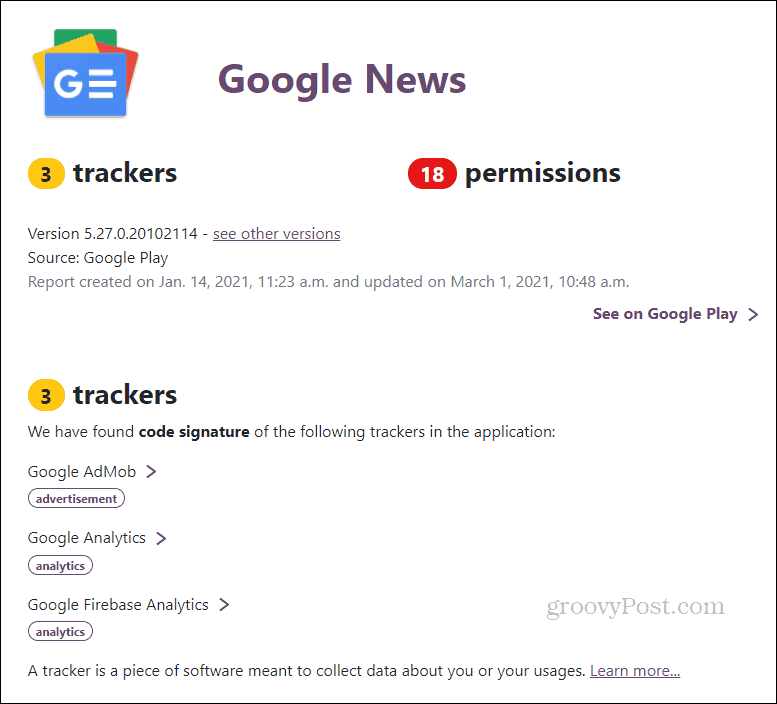
As mentioned above, the app is probably a better idea. It allows you to constantly keep an eye on your apps, also showing you the permissions apps have on your mobile device.
Let’s see how it works, then. After installing the Exodus app, it will scan all the apps you have installed and show you a list. Said list will refresh every time you start the app. It might take a little while to scan if you have lots of apps installed (like I do).

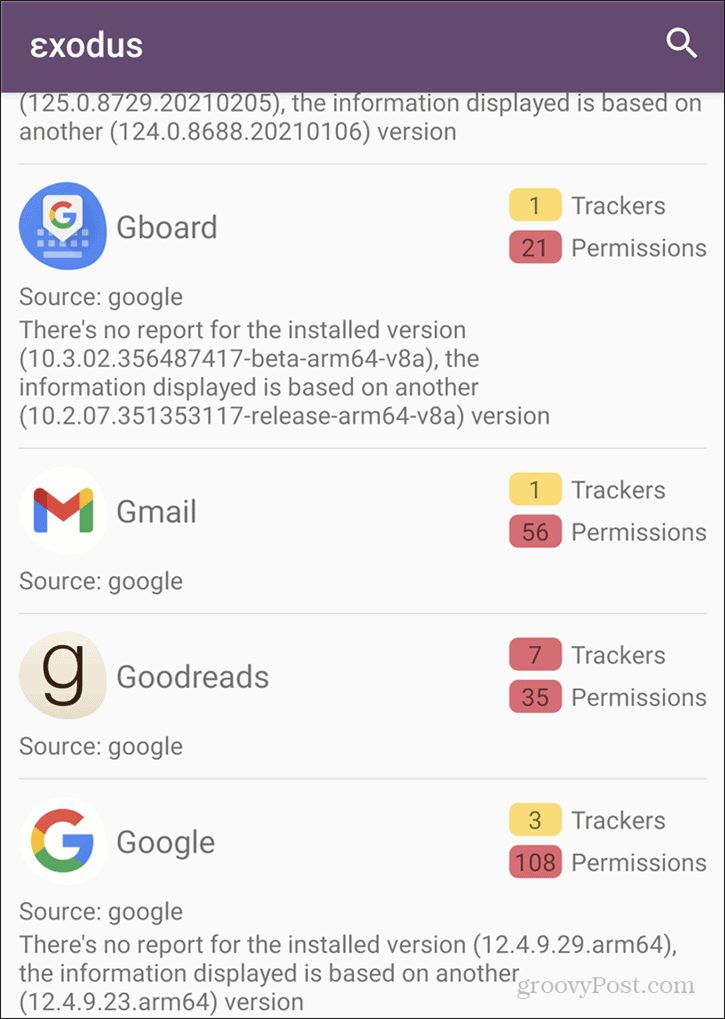
Apps and Trackers and Permissions
What you’ll come across just might surprise you. For example, LastPass has no less than seven third-party trackers, as you can see in this article. Goodreads has no less than 7 trackers and uses 35 permissions. When you consider the fact that Goodreads is owned by Amazon, this is starting to make sense (remember WhatsApp and Facebook sharing data?).

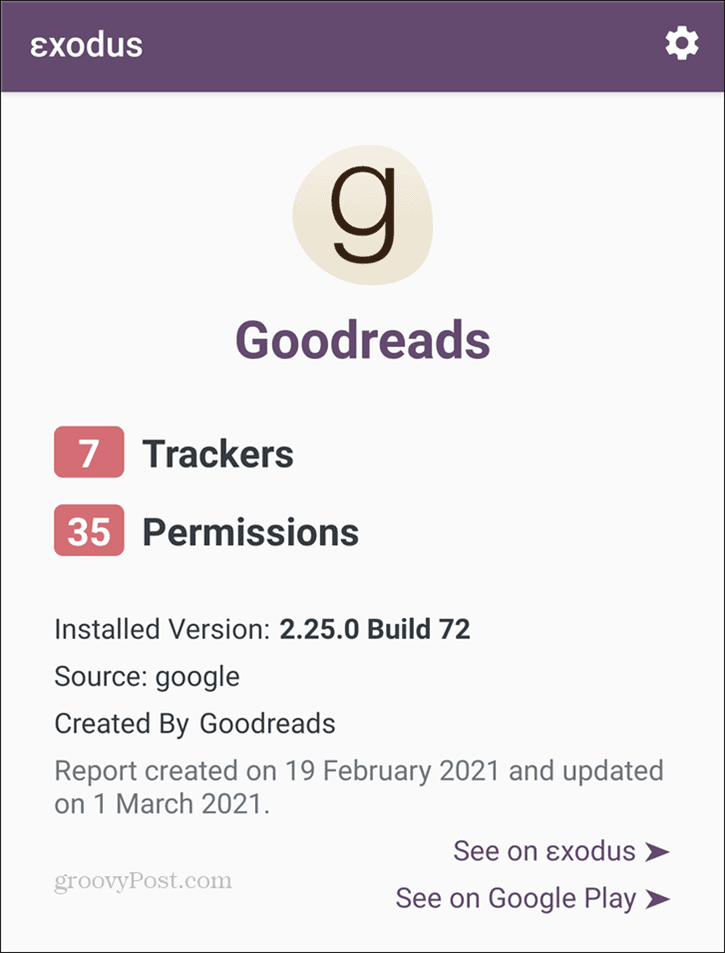
What is the most interesting and useful part of Exodus is you can find out more about each tracker and what they do. As you can see, I was right to suspect there would be something from Amazon in it for Goodreads.
![]()
![]()
Tapping any item will show details about the respective tracker and the website it comes from. It will also show you which other apps on your device are using it, so you have the whole story.
For permissions, you will be shown what they allow the app to do.
![]()
![]()
The permissions section will also show what features on your phone the app has access to. For example, the Bing app for Android has access to the camera, microphone, internal storage, and a lot more.

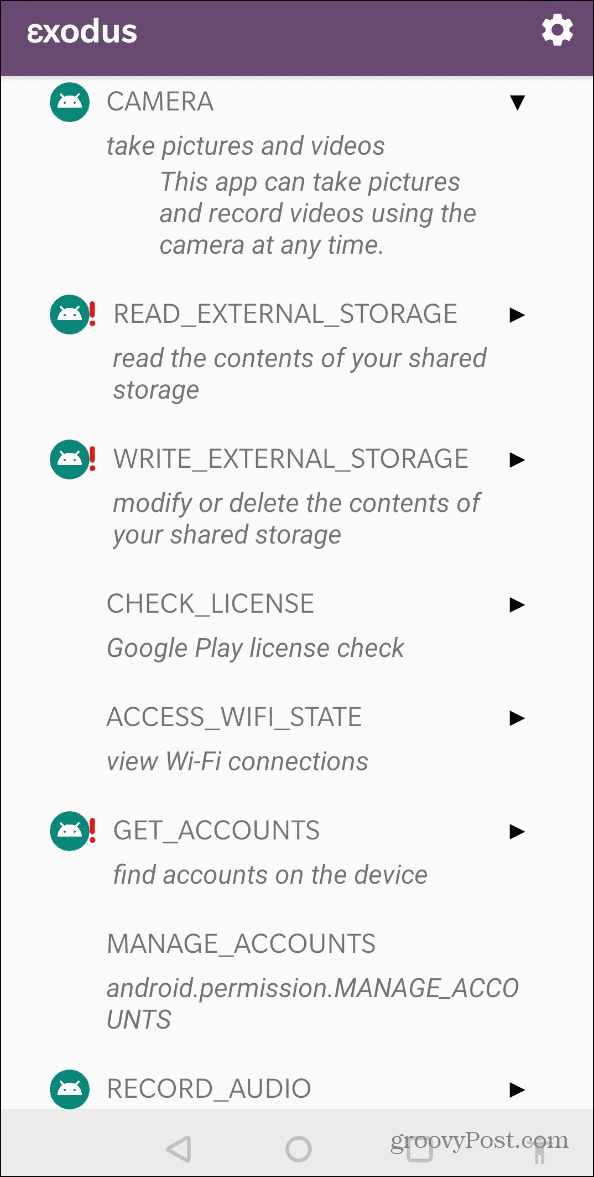
If you’re not comfortable with something in there, uninstalling the app is the best course of action. Luckily, Exodus allows you to make an informed decision in that respect.
Summing Up
Again, not all trackers are a bad thing. But Exodus allows you to easily research what each one does. On its site, you can even go back and look at what older versions of an app contained. For example, a previous version of the LastPass app used to contain 11 trackers — four were from Facebook.
Exodus gives you a better picture of what apps on your phone are doing. You get a better understanding of what they have access to on your phone and the type of data they could be collecting. Give it a try on your phone…you may be surprised at what you find.
You might end up thinking twice before installing what you might have thought was an innocent app or game.


